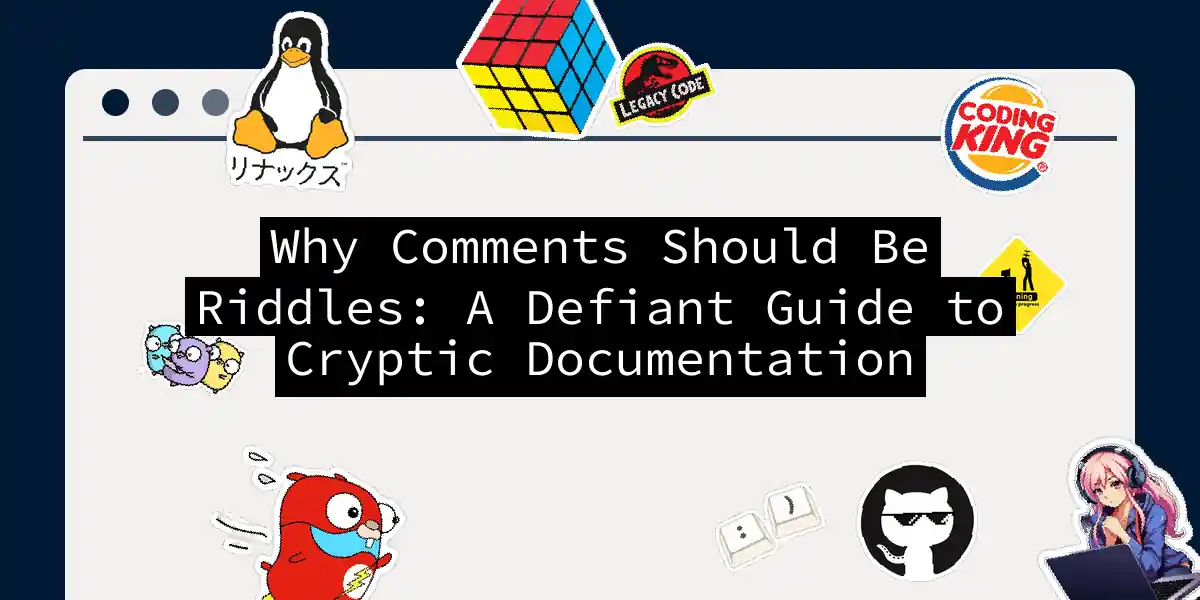The Art of Speaking in Code Tongues
Let me confess something: I once wrote a comment that simply said // FIXME: Halp! next to a sorting algorithm. Three years later, I found my own scrawled plea and realized I’d created the programming equivalent of an ancient Sumerian tablet. This, dear reader, is how I became an accidental pioneer of strategic obfuscation documentation.
Cryptic comments aren’t bugs - they’re features masquerading as philosophical koans. Let me show you how to weaponize ambiguity with style.
Chapter 1: The Hieroglyphic Hierarchy
True masters layer their obscurity. Observe this progression from amateur to enigma:
# Bad (Boring):
# Calculate circle area
area = π * r**2
# Good (Intriguing):
# Apply the Eldritch Formula (Ritual 42)
area = π * r**2 # Squaring the circle since 1882
The second version does three things:
- References mysterious “Eldritch Formula”
- Uses ritual numbering for pseudo-authority
- Adds historical flavor through fake chronology
When to Speak in Riddles: A Decision Matrix
| Situation | Recommended Crypticity Level |
|---|---|
| Legacy code you’ll never touch again | 🔮🔮🔮 (Full oracle mode) |
| Code reviewed by your ex-colleague | 💼☕ (Business casual mystery) |
| Safety-critical systems | ❌ (Just… don’t) |
| Code you’ll maintain in 6 months | 🕵️ (Breadcrumb trail) |
Crafting the Perfect Cryptic Comment: A 5-Step Ritual
- Find Your Muse
Stare at the code until it reveals its true name. Thatcalculate_interest()function? Clearly a “Temporal Wealth Alchemist” - Bury the LedgerNow they need your physical notebook to decode it
// Phase 3 requires inverse momentum // (See Black Notebook pg. 47) ApplyQuantumInterest(ref bankAccount); - Weaponize Cultural References
// How many roads must a Promise walk down? async function resolveDylan() { // The answer my friend, is await'in in the code } - Implement Cryptographic Escalation
// Decrypt with rot13: // "Gur jrfgrea fgevat vf abg jung vg frrzf" let password = "geo_jfgerag_fgevat".rot13(); - Leave Escape Hatches
# Seriously though: # Actual logic: Validate coordinates before DB insert # Coordinates validation matrix: https://...
mermaid graph TD A[Developer Reads Comment] –> B{Understood?} B –>|Yes| C[Disappointing] B –>|No| D[Summon Senior Dev] D –> E[30-Minute Debug Session] E –> F[Documentation Epiphany!] F –> G[Tribal Knowledge Increased]
### The "Why" Behind the Madness
Cryptic comments act as:
- **Cognitive speed bumps** forcing deeper engagement
- **Knowledge silo busters** (they *make* people talk)
- **Job security measures** (kidding... mostly)
- **Archaeological layers** for future code anthropologists
But heed this warning from the ancient scrolls (aka search result ):
> "Outdated comments can be more confusing than having no comments at all"
## Zen Koans for Modern Code
Try these ready-made enigmatic comments:
```java
// Like tears in rain
database.purge();
// For the maiden, the crone, and the three-eyed raven
if (retryCount == 3) backupProtocol();
// This is not the bug you're looking for
return new Result(isValid: false);
When Crypticism Backfires: A Cautionary Tale
My masterpiece:
# Solution to Halting Problem v0.9
while True:
print("This loop stops when you understand recursion")
The junior dev who found this now does transcendental meditation twice daily.
The Grand Experiment
Your challenge should you choose to accept it:
- Find the most straightforward comment in your codebase
- Rewrite it as a haiku/limerick/palindrome
- Wait for the first support ticket
- Report back with findings
Will you create documentation hieroglyphs or a maintenance nightmare? The line is thinner than a
border: 1px solid #fff;declaration. Where do you stand in the Great Comment Clarity Debate? Share your most brilliantly terrible comment below - I promise judgment-free admiration (and maybe slight concern).
